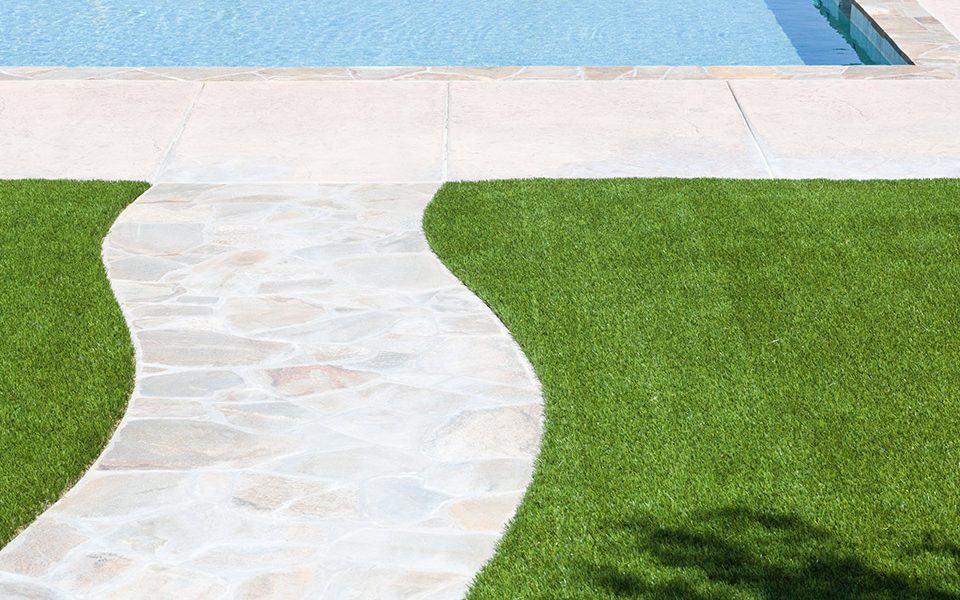Concrete Vs. Artificial Turf Around the Pool
Artificial turf and concrete are two materials that could not be more different. They are durable options used for landscaping, as athletic and sports surfaces, and as surfaces for entertaining. However, there are instances where one may be preferable to the other, such as around the pool.
If you plan to landscape the deck of your pool, your choice of landscaping will significantly depend on several factors, such as the look you prefer, durability, cost, functional performance, and resilience.
This article highlights the pros and cons of using each to help you choose between concrete and artificial turf for your pool deck and ensure you make the right investment for your yard. Read on to learn more about these great landscaping options.
Should I Get Concrete for Use Around My Pool?
Concrete is iconic and effortless. In the last few years, many people have chosen decorative concrete to make their properties look attractive. It is popular in modern construction, but is it the best option for use around the pool? Here’s what to keep in mind when considering a concrete pool deck.
Pros of Concrete
Durable
When you use concrete for your pool deck, you will not have to worry about replacing it for a long time. If you use the right sealant, not even the strong chemicals from the pool can affect the concrete’s color or durability. While the concrete may end up with cracks, you can easily fix them with a patch kit.
Low Maintenance
Concrete also requires little maintenance, considering no weeds can grow on it, and it does not need regular washing. With a few washes a year, the concrete will look great for an extended period. Simple washing and rinsing with soap and water should be enough to prevent grime and dirt from building up.
Customizable
Gone are the days when all concrete looked dull and gray. You can customize concrete to your individual style using the right shade, color, and design pattern that complements your pool’s overall appearance.
Cons of a Concrete Pool Deck
Slippery
This is not something you should be bothered about with plain, textured, or broomed concrete. But if you want to install stamped concrete, you have to remember that it can be slippery.
Stamped concrete uses a variety of colors to achieve the look of other decking materials and to maintain the appearance. It is sealed with acrylic sealant, which can make your deck slippery.
Concrete Cracks
Another downside of using a concrete deck is that it might crack, and there is nothing you can do to prevent that. You can, however, try to control the affected areas by ensuring you include control joints while installing the concrete. These are intentional breaks where cracks may form without affecting the overall design.
But regardless, there is no guarantee that you will not encounter random cracks in your concrete pool deck.
Appearance
Although you can customize concrete, it may still appear dull, unlike a lush green lawn, particularly the cheaper ones.
Staining
Concrete can also be affected by stains, especially the cheaper variants. If oil, spill paint, or tire markings get on it, it can be difficult to get them off, destroying the appearance of your pool deck.
Difficult to Repair
You can fix small cracks over time, but if they get bigger and break, they can be harder to deal with. Since it is nearly impossible to repair, you will probably have to remove and replace the entire section, which can be more invasive and expensive.
How About Artificial Turf For My Pool Deck?
Artificial turf has also grown in popularity for several good reasons. It is made of plastic material designed to feel and look similar to real grass. In fact, modern artificial grass seems so lifelike that you cannot notice it is not the real thing.
Pros of Artificial Turf Deck
Easier to Maintain
Artificial grass is always a breeze to maintain, and you do not need to do it frequently. Simply sweep any debris or leaves that fall onto it and hose it off once a month for easy cleanup. No weeding, watering, fertilizing, or mowing is required.
Durable
Most homeowners and businesses install artificial grass because it holds up well in harsh weather, from the perpetually-wet space near your pool to the sun. It can also last you more than eight years.
Great Feeling and Looks
Every homeowner knows how important it is to have a beautiful and inviting pool deck. Artificial grass is much more attractive than gravel or concrete. Even in a drought, the grass will still remain green, bright, and beautiful.
Avoids Water Waste and Runoff
Artificial grass is mainly porous, unlike concrete, which has unavoidable water run-off. It features micro holes in the base that facilitate drainage into the ground, so water cannot accumulate on them. It even dries up more quickly than natural grass.
Safer
Unlike concrete surfaces that may get slippery, artificial grass is a much safer landscaping option. It is soft and not slippery. Even if someone falls on it, the impact will not be as extensive as it would if they hit concrete.
Can Be Repaired
In case of any damage, you can get the affected part replaced with a new patch without replacing the entire lawn.
Cons of Artificial Turf
Can Absorb Heat During High Temperatures
Artificial turf is made up of a material that can easily absorb heat. That means it can get hot during summer, and you may be forced to spray it with water to cool it if the heat gets too much.
Expensive
Although you will save more in the long run with few maintenance costs, buying and installing new artificial grass is pricier upfront.
Concrete Vs. Artificial Grass: Which Is Best For A Pool Deck?
Choosing between artificial grass and concrete may be tricky. But with a solid understanding of your requirements, you can easily make the right choice. Artificial turf, however, has the upper hand due to low maintenance cost, drainage, safety, and durability.


